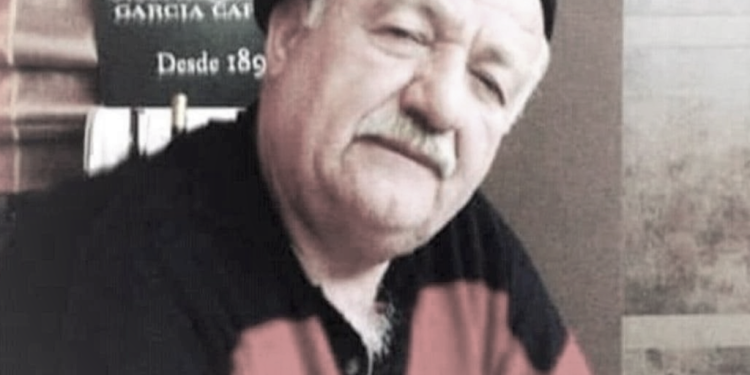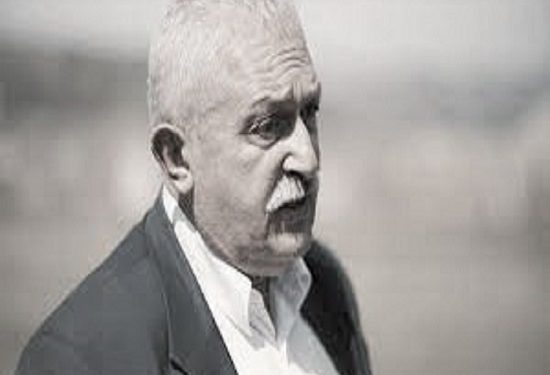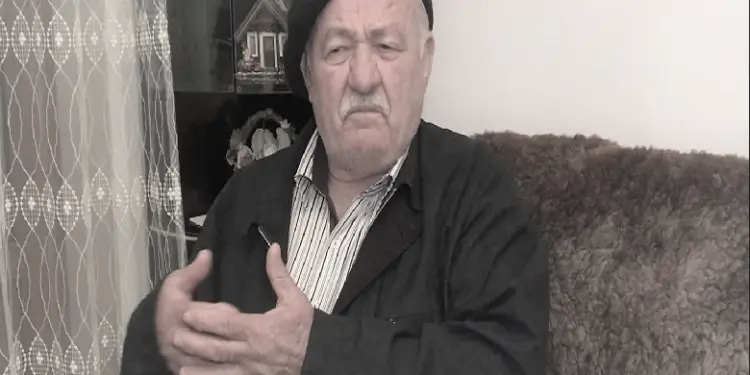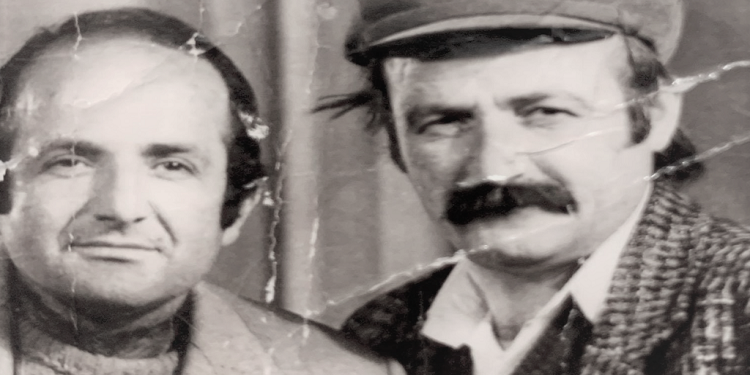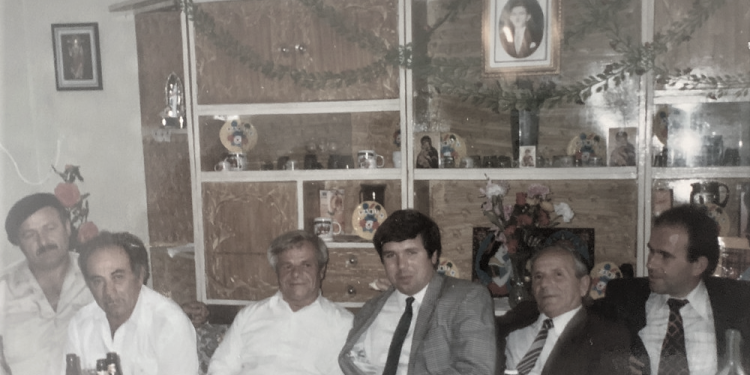By Marcel Hila
Memorie.al/Mail treatment in prisons and the crimes of communism. Demir Pojani, a former prisoner in Burrel Prison, testifies. He testified that when a prisoner died, his limbs, arms and legs were broken with a pickaxe and then placed in very small coffins. The bodies were buried in a place called ‘Cherry’, after the name of a cherry tree that was there, 500-600 meters away from Burrel prison. After 1965, the stadium was built in that place and the bulldozer was used. After this time, the dead were buried elsewhere, behind the prison.
Mr. Demir, thank you for agreeing to give this interview. As a former inmate at Burrell Prison, what can you tell us about the way inmates are treated there?
I was in Burrell Prison for 17 years and was convicted two more times: once because I hit one of the police officers, and the second time I was sentenced for agitation and propaganda in prison. But first I want to tell you who were imprisoned as “enemies of the people”, because even today people do not understand this.
The people described as “enemies of the people” had wonderful origins: their families had been contributing to the National Renaissance; their predecessors with great suffering achieved the goal of raising the flag in Vlora and ensuring the independence of the country. They were the grandchildren and great-grandchildren of this best part of the Albanians who spent their time in prisons.
The Communists created the Democratic Front organization. All those who were members of the Democratic Front had rights, and whoever was not a member had no right to defend the homeland, had no right to wave the flag, had no right to honor the fallen in war, that is he had no right.
It was just like in the time of ancient Rome: free citizens and slaves; they had taken us two thousand years later; they had taken us to the slave class, while for themselves they became slave owners of those who founded the state. It’s a song that became the anthem of Burrell Prisoners.
Her poem was written by Gaz Përquli from Shkodra, a wonderful poet boy: “High mountains say to Burrel / from the gorges, frosts bring frost / cold walls wait for us and the sun / and the iron window sky breaks”. There was also the nephew of Spiro Bellkamen, the great patriot of Independence, isolated in the dungeon.
The commander of Burrel Prison was Vangjel Rrëmbeci, a criminal. They show that when two boys were isolated in dungeons under the ground, they started singing the flag anthem. The other prisoners, witnesses of that time, that I got there, show that it sounded like the voice was coming out of the ground, it was so horrible.
In revenge for them, they nailed their door and no one went there until they died! They told us: Here they say Burrel, where he enters and does not leave! It was just like in the time of ancient Rome: free citizens and slaves. They had taken us two thousand years later; they had taken us to the slave class, while for themselves they became slave owners of those who founded the state.
They died, they were taken out, and they were thrown out, to the place, to the cherries. It was a great surprise that when a prisoner died there, they brought small coffins and with a pickaxe broke their legs, folded their bodies in the coffin and took them where they took them. I remember one case, when a convict died; they left him in the room.
We saw his legs broken, even though he was short. We asked what would be done with that man’s corpse and they told us: the garbage cart has gone to get some garbage in one place. When he’s done with the trash, he’ll come and get it.
That is to say, this was a man born and raised in a poor family, who owed nothing to communism, that, for example, large families owed them that they fought against communism that they also had a falling culture confronted communism, but this man owed him nothing.
Their hatred was so great that they wanted to take him to the grave in a garbage can! A friend, a friend, told me a story that others out there had told him.
A prisoner from Tropoja dies, a good man, and had to be shot to the ground. What do they do? They take one who was made a spy; they take another – a good man – and say to the spy: After you finish the grave, you will tell him to remove the last earth and you will hit him on the head with a pickaxe, then you will put them both inside.
At first he objected. They hugged him: You will do it! And they went both of them with him, and the dead three: but when he returned, only the spy came back, he who had slain his companion, and buried him there, and he who was dead, and they went to bury him.
I am now 73 years old and I have given interviews many times and I have said to myself: Demir, do not tell them all, that you are leaving your nation, that they will say: “How filthy these Albanians were! How could they have done this horror”? I thought so, not to tell them, but no! I see that he is still walking in the path of those bandits.
I would like you to tell us something about that place in Burrell Prison known as Cherry. How far was the cherry from the prison? How were burials performed? Who brought the corpses there? How did the holes open next to the other holes? Were there any hallmarks? What did you learn during your 17 years of experience in that prison?
I know something. Listen here. The song says: “The storm cannot wipe us all / No … Hundreds, thousands, have passed by thousands / from this prison have passed by thousands / Hundreds rest down the cherry / but the storm cannot wipe us all “The ship will arrive at the port one day.” It was the prophets who made the song.
Who made this song?
Gaz Perquli with Spiro Bellkamen’s nephew, I said. I do not know the name of these two, I know that he was a nephew, a sister nephew, a brother nephew, but he was a nephew. These two, one made the music, the other the poetry, and it became the song. Cherry was not far from the prison. It could be about 500-600 meters. I was told that today there is a stadium.
What about the bones that were buried there, what was done?
From, ja! I found a skull there, bones…! I went there, now in democracy. We went to see the cops who were there and the needles were the cops we left, who tortured us. By all means, we found them there. There is no place anymore, dig where you want – find bones, find bones where you want to dig.
They inserted the bulldozer. Do you understand? That job was done by bulldozer. To take a piece of land now and make it a sports field and with a bulldozer to free the place from these holes that were there.
They had no name, they had no tins. Usually a piece of paper is put in a bottle, or on a tin that does not rust it is named and so the bones are found, because it was needed for human rehabilitation, because mistakes are made…! It was a great surprise that when a prisoner died, small coffins were brought and his legs were broken with a pickaxe, his body was folded in the coffin and taken to where it was taken.
Agim Musta was in prison with Pjetër Arbnori and writes that in ’88 they dug a hole with a bulldozer, threw lime on him, melted his bones…! No, more, no, listen here! Bone melting has not done there. Where did they know and where did they want to know to hide the crime. They show it even today. “We did well!” they say it even today…!
There they took bulldozers, criminal action. They dug the ground, dug the soil across and made a stadium or whatever. We were there with Minet Xhavdem to look for his father, a very honorable man. Mr. Et’hem Xhavdemi, writer…! Now that work there, I think it was done before ’65. Until ’65, and here ’66, ’67 less often, we forgot the graves of the prisoners, because they were not taken there anymore. They took them after the prison, some 200-300 meters or 500 meters, to some thorns there. I took Fadil Dushku there, I took him there.
We have been told that it is a hill of the city cemetery behind the hill. Does this matter?
No, no, it has nothing to do with the city cemetery. I have not seen the city cemetery. There were policemen there who, when our friends died, said: “Hey, mo, did you die? Come on, one less! ”
You did not ask me how we ate, that food is the basis that keeps man on his feet. Some say 18 old ALL, 20 old ALL, 7 old ALL.
How was the food cooked there?
6.9 grams was oil, was 6.9 grams fat; soup we took two garuzhde, one at lunch and one at dinner; inside there were 45-46 grams of beans, or pasta, or rice. The pasta had a crocodile-like worm, it was the Russian pasta: we cut it in half, took out the worm and ate the pasta. This diet took the man to the end within 3 months: his glands got sick and if we look at them thinly, people who did not have regular help, no one lives today.
Younger than me, no one lives. He was the prison of physical elimination…! I said to myself: Demir, do not tell them all that you are leaving your nation that they will say: “How filthy these Albanians were! How could they have done this horror”? So I thought I would not tell them, but no! I see that he is still walking in the path of those bandits.
They used to say to us all day, “Hey, hey, they call it Burrel, where it goes in and it does not go out.” Saying this to a 25-30 year old boy is nothing short of horrible! Knowing that person had done nothing, but knowing that person belonged to a wonderful family. I can say that in Albania there are people who take power and fan the flames. Today Albania is more divided than ever, while we who have the courage to say what we want, we hate more: they are ready to eat our flesh.
How many people may have died in Burrel during the time you were or, you know, even further?
See….! As long as I was there, some 3-4 people hung themselves.
In what years have you been?
I was from 1973 to 1990. To count them, man, that I had friends: Gëzim Kuqi from Pogradec hanged himself, Mustafa Bajraktari from Tropoja hanged himself, Lefter Baltovani from Saranda hung himself, tried to a boy from Korça hanged himself, later, Fadil Dushku from Elbasan hung himself. Four people hanged themselves. During this time that I was, Muharrem Buçpapaj, Skënder Alucë’s father from also died of cancer…!
What were they doing?
So that there would be no death toll, that they would find out who was serious and take him to the hospital, but from there he did not return and it was not even known what had been done to the human body and where they had thrown what he allegedly threw led to the hospital. During the time I was there, some 10-12 people may have died; 5-6 hung them and among them, even my best friends: Mustafa Bajraktari, Fadil Dushku and Vrioni, the desolate Iljazi, and he died there.
How was the procedure there when someone died?
But there was no procedure at all. They would give him saliva that he was peeling and he would say: “Let’s take it away and throw it in the pit!”
Who took the dead?
Prison workers. Prisoners, external workers of the Municipality, yes.
Do they come every day?
Yes. The prisoner was taken to the door, where we met. They took his legs out, there was a pickaxe there, and they broke his legs “bam” and folded them, closed the coffin, put them in a cart and took them where they wanted. There were policemen there who, when our friends died, said: “Come on, one less”. The friends said: “Hey, mo, at Cherry? Cherry. Cherry. That cherry…! How many great men there were, and how many were buried. By killing the smart, we remained who we are and communism further selected people. These came and for 45 years wiped out what the centuries had done and created the new man. My mother, what they created! Even today we continue with the young man.
What was life like in Burrel? How did the day start, how did it end?
Look! The vast majority of prisoners had their minds on books. Did not work at Burrel? No, no, there was no work. You were closed for 22 hours, we went out for 2 hours and those 2 hours were shortened sometimes. There was an idea born of prisoners “Even though you are in prison, do not stay in prison!” and we got to read. We chose a protagonist, according to the character, we chatted with him. Many of us prisoners, without seeing Paris with our own eyes, know him from Hugo, London from Dickens and others.
This was life, and besides, we tried to quench our hunger with what we had, because there the hunger was chronic: no one was full; even those who had help from home were not satisfied. A chronic famine that lasted for years and years, plus that, those horrible dungeons with a blanket. Do not leave two pairs of pants, do not leave a sweater, vest or jacket, no, one was allowed, to die. I wonder how they were parents, when they saw the age of their children lying in those horrors?! How did they put the signature on the payroll, how did they get the money?
There was a policeman, Xh. D., who ate slave meat in prisons. But they are here, among us.
Were you tortured in Burrell Prison? Was there violence?
One of the dirtiest tortures was the Operatives, the Operations Office who picked up people to spy on them and started the procedure: not letting them make appointments, not allowing food, creating very bad impressions as if they were all dead family, do not take letters. We found the family letters torn in the toilet: they used them.
There was no greater torture than that, to see the letters that his mother had brought him, that the policeman had wiped his butt and deliberately threw it there, so that you could find him. We did not tell him many things, but now that we see what is happening, I will tell you where they come from: they come from those who eat the flesh of slaves, and either he would spy on you, or they would have no medicine. I know my friends, plus what I removed myself…! I defeated them; I defeated them with bones, with fists of blood.
Yes what they have removed a part! We even heard it when it broke. We cried for them, that for us, the day they were broken, they were dead, they were not. The prisoner was taken to the door, where we met. They took his legs out, the pickaxe was there, and they broke his legs “bam” and folded it, closed the coffin, put it in the cart and took it where they wanted. . Pjetër Arbnori was never pardoned by those who made the statements and sentenced him three times in a row, up to 30 years in prison.
I do not forgive you, stay calm! The one who committed these atrocities, the one who condemned Peter, the one who condemned my friends and me…! Man has a life to live. He is born to live, because God has given it to him. You have no right to take the lives of others with those statements, to benefit from a ration of soup! But there were also as many good men as you wanted. There were Albanian men there who suffered like men, so much so that we surprised them.
Mr. Demir, thank you very much for this interview.
I thank you Mr. Marçel, for this work you are doing, because the crimes of that bloody regime of dictator Enver Hoxha must be brought to light and documented. Memorie.al




